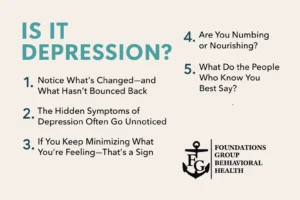Some weeks feel like a fog. Work piles up. Sleep gets weird. You cancel plans and tell yourself you’ll bounce back next week.
But what if you don’t?
What if “next week” keeps not showing up—and the fog doesn’t clear?
For people exploring their mental health—especially those who identify as sober curious or simply wanting to feel more present—it can be hard to tell when it’s time to seek help. There’s no flashing red light that says This is depression. More often, it’s a quiet shift that starts to take over everything.
This post is for the person wondering if what they’re feeling is just a stressful week… or something deeper. If that’s you, keep reading. You deserve clarity—and support.
Our depression treatment program in Cape Cod, MA offers exactly that.
1. Notice What’s Changed—and What Hasn’t Bounced Back
One of the simplest ways to spot the difference between a passing slump and a deeper struggle is to look at your recovery time.
Everyone has bad days. Even bad weeks. But typically, you return to baseline with time, sleep, movement, or connection.
If none of those are working anymore—if even your go-to resets don’t touch the heaviness—you might be dealing with more than just a rough patch.
It’s not about how dramatic the symptoms are. It’s about how persistent they’ve become.
2. The Hidden Symptoms of Depression Often Go Unnoticed
Depression doesn’t always look like crying in the dark or staying in bed all day. Sometimes, it looks like getting through your day in a fog. Or laughing at a joke and feeling nothing inside.
Here are some lesser-known signs of depression that we often see in clients who didn’t think they were “bad enough” to need help:
Signs You Might Be Experiencing Depression:
- You’re sleeping more—but waking up exhausted
- Music, food, or movies don’t hit the same anymore
- Your focus is shot, even on tasks you care about
- You feel detached in conversations—like you’re watching yourself participate
- You’re numb in moments where you’d usually feel joy or grief
- You keep saying “I’m fine” but it doesn’t feel true
- You’re irritable in a way that surprises even you
These symptoms might seem small individually. But if you’re stacking several of them together, it’s time to take them seriously.
And if you’re in the Cape area and wondering what support might actually help, a depression treatment program in Barnstable County, MA is a good place to start.
3. If You Keep Minimizing What You’re Feeling—That’s a Sign
Here’s a trick question: How do you know it’s not depression?
For many high-functioning people—or those who’ve spent years pushing through hard things—the first instinct is to downplay. I’m just tired. Everyone’s struggling. It’s not that bad.
But if you’re constantly explaining away your symptoms or comparing them to someone “worse off,” that’s a form of emotional suppression. And it’s often driven by fear. Fear of what it means to name what you’re really feeling. Fear of needing help.
But here’s what’s true:
You don’t need to hit bottom to seek support.
You just need to want more from life than what you’re currently experiencing.
And if you’ve ever thought, Maybe I’d feel better if I just took this seriously, then yes—there’s something here worth looking into.
4. Are You Numbing or Nourishing?
One of the most common patterns we see among people who are “doing fine on paper” but emotionally struggling is this: they cope more than they care.
What does that mean?
It means relying on numbing habits to get through the day—like scrolling, zoning out with TV, doom-planning, or keeping your calendar jam-packed—without ever really resting.
Coping helps you survive the day.
Nourishing helps you feel better over time.
If your daily patterns look more like escape than restoration, you may be coping with undiagnosed depression.
A structured treatment program helps you shift that dynamic. Not with pressure, but with support, clinical insight, and space to be real.
5. What Do the People Who Know You Best Say?
Sometimes the signs are clearer to others than to you.
Have friends or family noticed a change in your energy? Do you find yourself saying “I’m just tired” more than usual?
You don’t have to take their concern as a diagnosis—but don’t brush it off either. The people who love you are often tuned into subtleties that you’ve learned to overlook.
If they’re gently asking if you’re okay… take the invitation to check in with yourself more deeply.
And if you’re not sure how to even begin that check-in, reaching out to a depression treatment provider in your area—like our Falmouth, MA location—can help you sort through the fog.
6. You Don’t Have to Be Sure to Start Exploring
Let’s say you’ve read this far and you still don’t know. You’re not sure if what you’re feeling is “depression” or if you’re just burned out. You’re not sure what kind of help you’d even want—or if you’d be open to a formal program.
That’s okay.
Exploring treatment options doesn’t mean you’re locked in. It doesn’t mean you’ve failed. It just means you’re curious—and courageous enough to follow that curiosity somewhere meaningful.
At Foundations Group, we believe that kind of curiosity is the exact right place to begin. Our programs are designed to help you understand your emotional patterns, build sustainable skills, and reconnect with the version of you that actually feels present, hopeful, and connected.
Even if you’re not sure you “need” it—reaching out might be the first time something actually feels like relief.
FAQ: Depression Treatment Program Questions, Answered
Do I have to be diagnosed with depression to start a treatment program?
No. Many people begin treatment unsure of what they’re experiencing. Our team can help you explore what’s happening, offer assessments, and guide you toward a care plan that fits your needs and goals.
What types of treatment are included in your depression programs?
At Foundations Group Behavioral Health in Cape Cod, we offer both group and individual therapy, evidence-based modalities like CBT and DBT, and supportive programming tailored to your emotional and functional needs.
How long is the depression treatment program?
Program length varies. Some clients benefit from a few weeks of intensive support, while others may participate for several months. Our team works with you to determine what feels supportive—not overwhelming.
I’m still working full time—can I do treatment around my schedule?
Yes. We offer outpatient options that accommodate work, school, or family life. Whether you’re in Falmouth, Barnstable, or the surrounding Cape Cod area, we’ll help you find a schedule that supports your healing.
What if I start the program and realize it’s not a good fit?
You’re never trapped. We prioritize transparency and collaboration. If something isn’t working, we’ll talk about it—and find a better approach together.
Ready to Talk?
If you’re feeling off and don’t know why—don’t ignore it. You don’t have to wait for things to fall apart to deserve support.
Call 888-685-9730 or visit our Depression treatment program in Cape Cod, MA to learn how Foundations Group Behavioral Health can support you in feeling better.
This doesn’t have to be your normal. Let’s find what better feels like.









